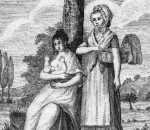
 Jacques André Millot, L'art d'améliorer et de perfectionner les hommes, au moral comme au physique, 1801, BIU Santé.
Jacques André Millot, L'art d'améliorer et de perfectionner les hommes, au moral comme au physique, 1801, BIU Santé.
Initially, doctors took an interest in the physiology of milk: how was the substance made in a women’s body? Long thought to be whitened cooked blood produced in the uterus, it was sometimes suspected of causing sickness in women and children. Considered an extremely powerful fluid, it had, up until the 18th century, very little to do with the natural image bestowed upon it since.
It is at that juncture that medicine and science captured the issues implicated in maternal breast feeding. This is when the personification of nature as a nurturing mother appeared in medical books. The breastfeeding of the child by their own mother was mooted as a moral confirmation of a healthily functioning society: each class would thus be kept in its place. The elites’ children would not run the risk of being brought up by the poor. A new model of parenthood and a new idea of the nation appear in Rousseau’s L’Emile. Corrupted mores and female autonomy had, it was alleged, pushed humankind away from a lost society close to nature. In other words, culture, nay politics, had removed women from their natural functions.
The moralists’ concerns around newborn health fell in line with those of physicians, notably over fears of depopulation. Doctor Jean-Charles Des Essartz, author of the Traité de l’éducation corporelle – one of L’Emile’s medical references – alleged that it was the very practice of sending children to wet nurses that was the main cause of infantile mortality and thus threatened the preservation of the species. Thus was the discourse on the need to breastfeed newborns built up over the years, notably in 18th and 19th century medical texts. Such writings did, however, conceive of a number of exceptions that would prove the naturalness of breastfeeding. For indeed not all breastfeeding women were perceived in the same way. Country women were thought better breastfeeders than city women, those form the lower – working – classes better than those from the middle classes, liable to fall prey to indolence… European women – “more beautiful but delicate” were apparently not a priori good breastfeeders. Supposedly superior, they proved, in last resort, less suited to the work of breastfeeding than women from elsewhere – colonial subjects, considered closer to nature, nay to the animal world. Nevertheless, physicians also asserted that in the interest of the newborn’s health, it would be best for breastfeeding to be “maternal”
These considerations show how the naturalness of breastfeeding in these medical treatises was subservient to a political idea of the Nation and was bound up in an explicit hierarchisation of classes and races. Upper class children are to be brought up and fed by medically approved bodies and minds… Any thoughts about the others? These issues, focussed on women’s body and children’s well-being would incidentally further fuel the debates about so-called artificial bottle feeding and the formula milk industry during the 19th and 20th century. Though bottle and animal milk feeding has been practiced since antiquity it is in our time that polemics for or against breastfeeding refuse to go away exposing the way in which milk has become a political object over the ages.
Read more in the dictionary : Criminal abortion - Puerperal insanity
Read the paper in French : Allaitement
Références :
Yasmina Foehr-Janssens, Veronique Dasen, Irene Maffi, Daniela Solfaroli, Francesca Arena, et al., « Lactation in History. Pour une histoire de l’allaitement maternel. Pratiques, représentations, politiques de l’Antiquité à nos jours », dans Estelle Herrscher & Isabelle Séguy (dir), Premiers cris, premières nourritures, PUP, 2019, p. 317-336.
Yasmina Foehr-Janssens, Daniela Solfaroli Camillocci (dir.), Allaiter. Histoire/s et cultures d'une pratique, études rassemblées par Francesca Arena, Véronique Dasen, Yasmina Foehr-Janssens, Irene Maffi, Daniela Solfaroli Camillocci, Brepols 2020, 2 volumes.
To quote this paper : Francesca Arena, “Breast feeding”, in Hervé Guillemain (ed.), DicoPolHiS, Le Mans Université, 2022.